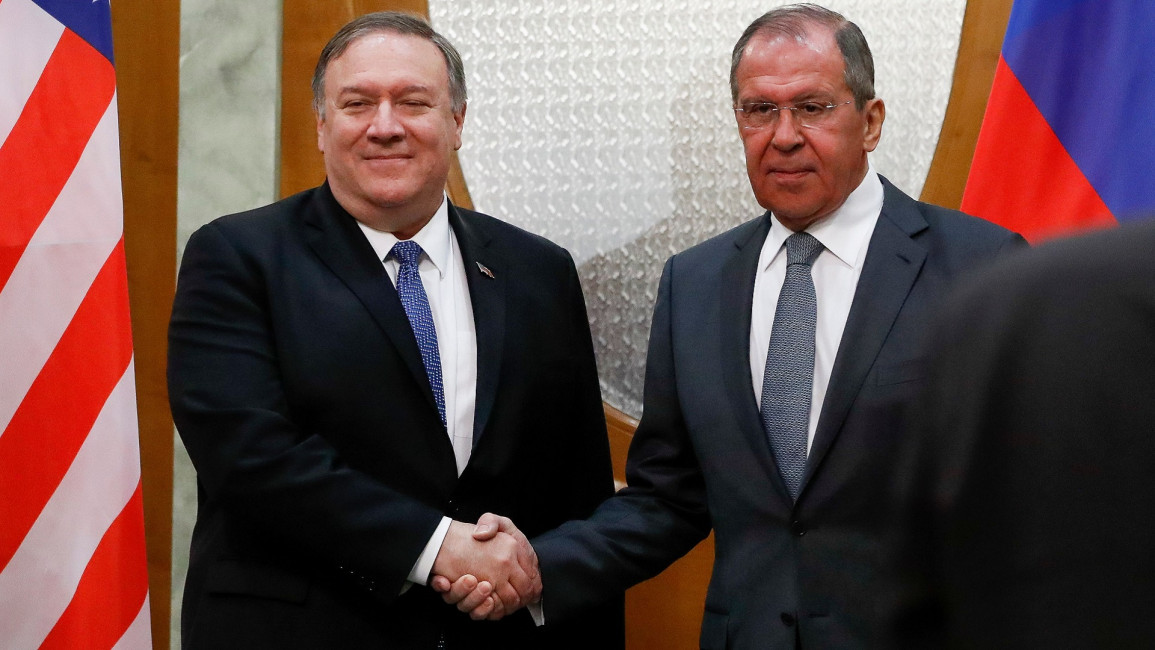Pompeo visits Russia as US moves closer to conflict with Iran
US President Donald Trump wants to find ways to cooperate with Moscow, Secretary of State Mike Pompeo said Tuesday, as he opened talks with the Russian leadership amid heightened tensions between Washington and Tehran.
"I am here today because President Trump is committed to improving this relationship," Pompeo said as he started a meeting with Foreign Minister Sergei Lavrov in the Black Sea resort of Sochi.
Lavrov told Pompeo that Moscow was ready to open a new page in ties weighed down by a raft of issues from arms control to Iran.
"I believe it's time to start building a new, more responsible and constructive model of mutual perception of each other... We are ready for this," Lavrov said in the Black Sea resort of Sochi, where Washington's top diplomat was also set to meet President Vladimir Putin.
Earlier on Tuesday, the Kremlin slammed Washington's "maximum pressure" campaign against Iran.
Pompeo's visit to Russia - his first as Secretary of State - came as tensions mounted dangerously in the Gulf, with Iran and the US engaged in a war of words over Tehran's nuclear deal with world powers and an alleged attack on four ships in the UAE port of Fujairah. Iran and the US have blamed each other for the attack.
Pompeo is the highest-ranking US official to see Putin since July 2018, when Trump met him in Helsinki and stunned the US political establishment by appearing to accept the Russian leader's statement that he did not meddle in the US election, contrary to US intelligence evaluations.
Twitter Post
|
On Monday, Pompeo had cancelled a stop in Moscow to instead have an unscheduled meeting in Brussels with European foreign ministers, who have been uncomfortable with US' hawkish moves towards Iran.
Washington has pulled out of a nuclear deal backed by the Europeans, Russia and China and has slapped sweeping sanctions on Iran in an all-out effort to curb Tehran's regional clout.
The US has recently ramped up the pressure by saying the deployment to the region of an aircraft carrier strike group and nuclear-capable bombers was to counter vaguely described threats from Iran.
The renewed diplomacy between Moscow and Washington follows a long-awaited report by investigator Robert Mueller. He found that Russia interfered in the 2016 election but that there was insufficient evidence to conclude that the Trump campaign colluded with Moscow.
Besides Iran, Washington and Moscow are at loggerheads on an array of urgent strategic questions, including Venezuela, the Syrian conflict and the conflict in Ukraine.
Both the US and Russia hope to make some progress on arms control. Moscow is seeking a five-year extension of the New START treaty, which caps the number of nuclear warheads well below Cold War limits and is set to expire in 2021.
The US president's enthusiasm for courting Putin has little support in Washington, even within his own administration, which has kept up a campaign of pressure on Moscow including sanctions on Russia over alleged election meddling and the country's support for armed separatists in Ukraine.
Pompeo, despite his close relationship with Trump, left little doubt on where he stood in remarks Saturday in California.
Addressing the conservative Claremont Institute, Pompeo said that US policymakers in recent decades had "drifted from realism".
He chastised them for believing that "enfolding the likes of China and Russia into a so-called rules-based international order would hasten their domestic evolution towards democracy".
"We can see now 30 years on, after the end of the Cold War, that the Putin regime slays dissidents in cold blood and invades its neighbours," Pompeo said.



